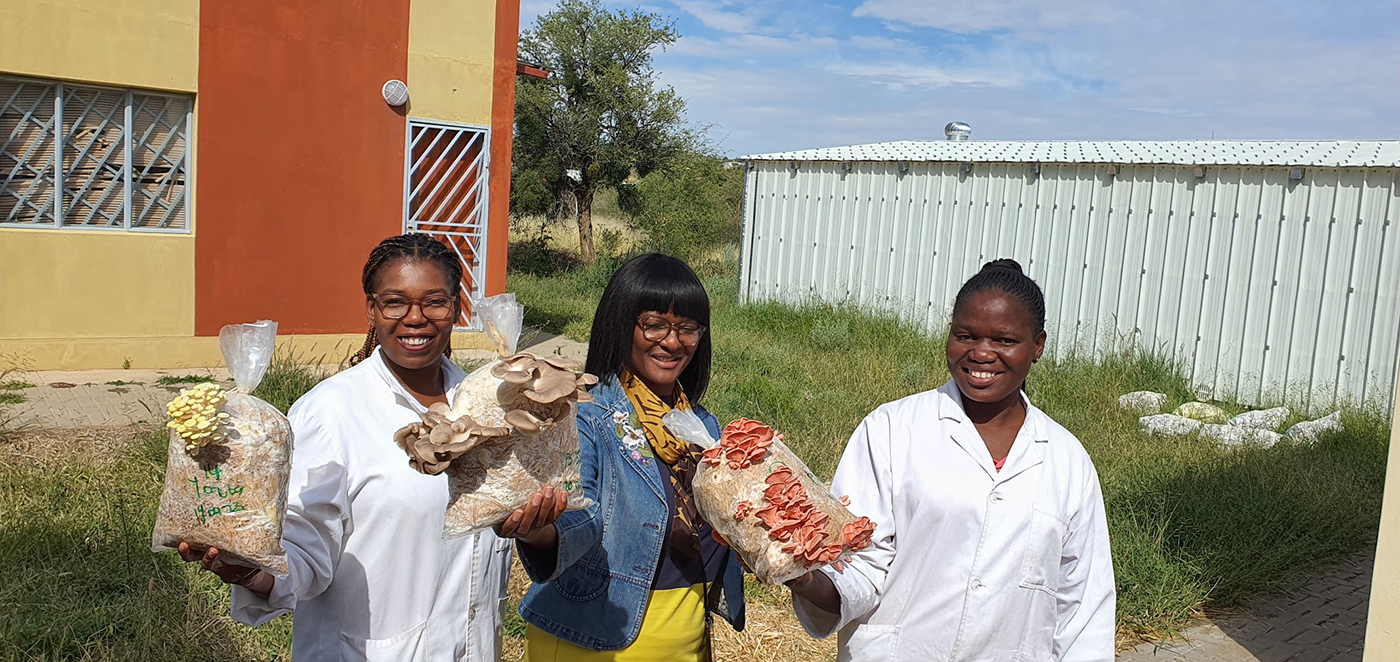In a ground-breaking development, the Zero Emission Research Initiative (ZERI) facility, at the University of Namibia (UNAM), proudly announces the successful production and trial of pink mushrooms, known as Pleurotus djamor. This remarkable achievement has sparked excitement among researchers, farmers and food enthusiasts alike, due to the unique qualities possessed by these vibrant fungi.
The UNAM team involved in this pioneering project comprises 4 dedicated researchers, who are not only conducting cutting-edge research but also actively promoting mushroom cultivation in Namibia. Working in collaboration with student interns and local communities, the team has introduced the pink oyster mushroom to the country, a variety originating from KwaZulu Natal, South Africa.
Dr Lydia Horn, Ms Isabella Ueitele, Prof Nailoke Kadhila and Dr Fimanekeni Shivute spearhead this initiative. They have been instrumental in training individuals interested in mushroom cultivation and making high-quality spores available at the ZERI facilities.
Dr Horn, ZERI Coordinator, said: “For aspiring growers and farmers, oyster mushrooms present a remarkable opportunity.

“These fungi are renowned for their ease of cultivation and short crop cycle, making them a highly productive vegetable that can generate both sustenance and income.”
Despite their short shelf life, oyster mushrooms can be easily preserved through drying, ensuring their availability for future use, she added.
She enticed farmers further said: “The spent substrate from mushroom cultivation can be transformed into compost, which in turn serves as a valuable medium for vegetable production and animal feed.”
Mushrooms offer a multitude of benefits, both as a nutritious addition to one’s plate and as a promising venture for potential growers and farmers. Ms Ueitele, Senior Technologist at ZERI, said: “Compared to vegetables, mushrooms have a higher protein content, making them an excellent source of essential nutrients.
“Particularly, Pleurotus species, such as the pink oyster mushroom, are rich in proteins, minerals (Na, Ca, P, Fe, and K), and vitamins (Vitamin C and B complex). These qualities make oyster mushrooms an ideal meat substitute, especially for vegetarian dishes.”
It is crucial to underscore the broader significance of this breakthrough. Dr Shivute, a researcher with ZERI stated the following: “We strongly encourage communities to embrace mushroom cultivation as a means to enhance food security, foster self-employment and generate income.”
“By harnessing the potential of mushrooms as a viable alternative to meat, Namibia can promote the health and well-being of its people while simultaneously addressing pressing socio-economic challenges”, she further elaborated.
This extraordinary feat accomplished by UNAM’s research team at the ZERI facility stands as a testament to the University’s commitment to innovation, sustainability and societal progress.
The next ZERI Mushroom Cultivation Training session is scheduled for 20 – 23 June 2023. Interested individuals can secure their spot by sending an expression of interest email to: iueitele@unam.na or npkadhila@unam.na





